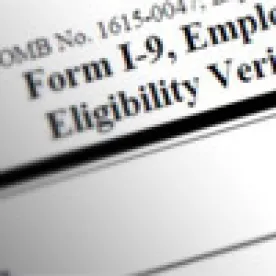Earlier in 2017, new rules became effective from the U.S. Department of Justice’s (DOJ) Civil Rights Division impacting the authority of the Immigrant and Employee Rights Section (IER)—formerly known as the Office of Special Counsel for Immigration-Related Unfair Employment Practices—to self-initiate immigration-related discrimination investigations. While they were overshadowed by President Trump’s inauguration and executive orders, these new regulations merit attention because they increase the time frame for IER to conduct investigations of companies. Previously, IER may have been deterred by the quicker time frames from learning about an unfair employer practice, opening an investigation, and filing a complaint. Now, the new rules provide IER with ample time to complete its investigation and pursue penalties against an employer—a development that raises both the stakes and the onus of compliance for employers.
What Does IER Do?
IER is responsible for enforcing the anti-discrimination provision of the Immigration and Nationality Act of 1965 (INA). That provision, found at 8 U.S.C. Section 1324b, generally states that it is improper for a company to discriminate against someone based on his or her national origin or citizenship status. Individuals who feel they have been injured by a violation of this provision can file a discrimination complaint directly with IER within 180 days of the alleged act by the employer. IER also has the authority to initiate independent investigations based on information developed during individual charge investigations or information provided by other government agencies or the general public. Thus, IER serves a similar function as the Equal Employment Opportunity Commission (EEOC).
IER commonly investigates employers that are using unfair documentary practices to screen employees. This typically occurs when an employer asks individuals—oftentimes lawful permanent residents—to provide specific documentation (e.g., the permanent residency card) for the completion of the Form I-9. Requiring specific documentation is a violation of the anti-discrimination provision of the INA. As a result, an employer that thinks it is being prudent in complying with work authorization requirements for the Form I-9 can find itself in trouble with IER when it takes its screening measures too far.
The Expansion of IER’s Investigatory Time Frame
The regulations governing unfair immigration-related employment practices within IER’s jurisdiction provide two different avenues for investigation: an impacted employee can file a charge with IER alleging misconduct or IER itself can open an investigation into discriminatory actions.
Employee-Prompted Investigations
Individuals alleging unfair treatment must file a charge with IER within 180 days of the wrongful employment practice. IER must then undertake and complete its investigation of the charge within 120 days. If IER believes there was discriminatory conduct, it may file a complaint on behalf of the impacted employee with an administrative law judge. If IER concludes there was no discriminatory conduct, then it must inform the impacted employee that it will not be filing a complaint. The impacted employee then has 90 days to bring a complaint before an administrative law judge. There were no significant changes to employee-prompted investigations in the new regulations.
IER-Initiated Investigations
IER also has the ability to initiate investigations itself when a charge isn’t filed by an individual. But in the new regulations, IER seeks to clarify the time limitations associated with these self-initiated investigations. The motive behind IER’s clarification is curious.
The governing statute for IER’s self-initiated investigations, 8 U.S.C. Section 1324b(d)(1), states the following:
The Special Council [otherwise known as IER] may, on its own initiative, conduct investigations respecting unfair immigration-related employment practices and, based on such an investigation and subject to paragraph (3), file a complaint before such a judge. [Emphasis added.]
Paragraph (3) states the following:
No complaint may be filed respecting any unfair immigration-related employment practice occurring more than 180 days prior to the date of the filing of the charge with the Special Counsel. [Emphasis added.]
The relationship between these two provisions is confusing because a charge is never filed in an IER-initiated investigation. Since no charge is filed, the new regulations essentially substitute “filing of the charge” with “open[ing] an investigation” to clear any confusion. In other words, the new regulations state that IER must only open an investigation into the alleged discriminatory act within 180 days of the unfair action to satisfy 8 U.S.C. § 1324(d)(3). While this is similar to the time frame allowed for an employee to report an act to IER, the same additional time deadlines associated with filing a complaint in an employee-initiated investigation don’t apply to IER in a self-initiated investigation. Instead, IER would likely only be subject to equitable deadlines for filing complaints and the five-year statute of limitation for imposing civil penalties. This is a dramatic increase in IER’s investigatory authority, especially when looking at the history of the governing regulations and DOJ’s past practices.
With these new regulations, the DOJ is changing its course from previous regulations passed to implement 8 U.S.C. § 1324(d). In the 1987 version of the regulations, the DOJ made clear that Congress intended to place the 180-day limit on IER’s actions in a self-initiated investigation. Specifically, the DOJ stated the following:
Section 44.304(b) has been amended in the final rule to limit the period of time in which the Special Counsel, on his or her own initiative, may investigate and file a complaint of an unfair immigration-related employment practice. We believe that requiring a complaint to be filed within 180 days of the occurrence of an unfair immigration-related employment practice is a reasonable implementation of the desire of Congress reflected in 8 U.S.C. § 1324b(d)(1), (3), to place a time limit on the actions of the Special Counsel. [Emphasis added.]
The DOJ also admits in its current rulemaking that its past practice has been to enter into stipulations to extend the complaint filing date when IER needs more time to conduct an investigation or facilitate settlement. Now these stipulations will likely not be needed under the new regulations. As a result, IER appears to be changing its prior practices by increasing its ability to self-investigate claims of national origin discrimination by only requiring that it open an investigation—not file a complaint—within 180 days of the alleged discriminatory act.
Impact on Employers
The regulations promulgated by the DOJ were developed under the Obama administration. So far, the Trump administration has not weighed in on how it will address this additional investigatory authority. There does not, however, appear to be a dramatic increase in the amount of self-initiated investigations started by IER.
Despite the lack of data on increasing investigations, it is clear that IER has much more wiggle room to self-initiate investigations into employer misconduct. As a result, employers find themselves in an even more difficult situation when it comes to I-9 compliance. If employers go too far in requiring specific documentation during the I-9 intake process or act in other discriminatory ways, they could find themselves subject to a self-initiated investigation from IER that drags on for years.




 />i
/>i

